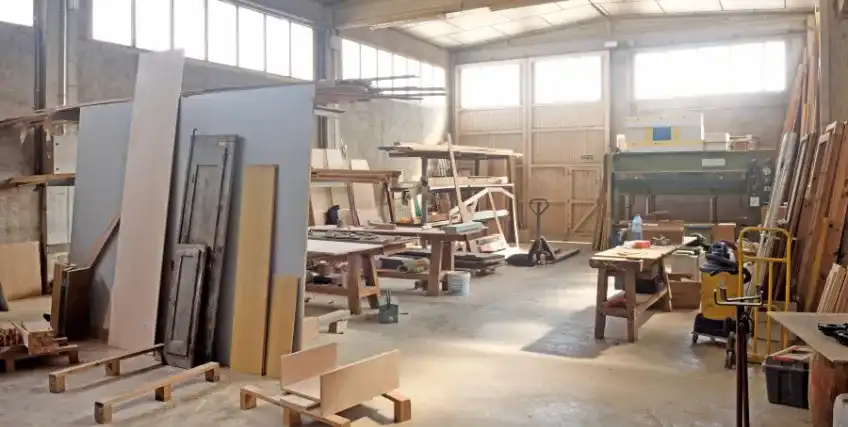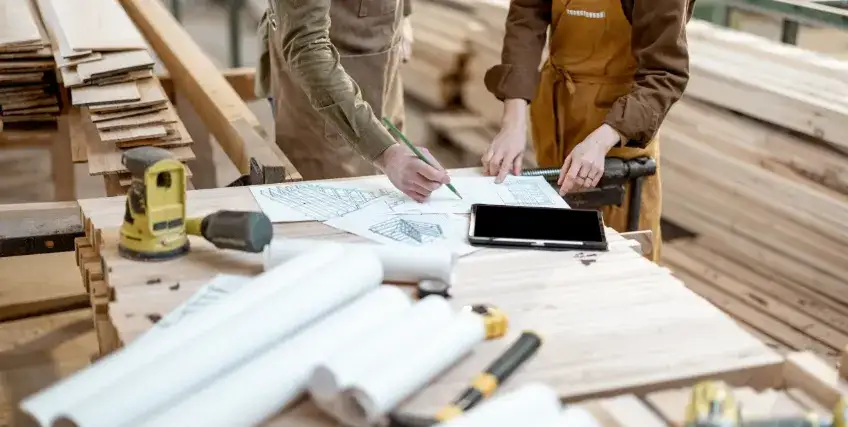Is a Small Business Loan Right for Your Carpentry Company
Sep 30, 2025 | Last Updated on: Oct 1, 2025

As a small business owner, you run a small carpentry shop in a busy American town. Your orders are steady, but the challenges never seem to slow down. Lumber costs rise without warnings, clients delay payments after projects are finished, and equipment needs constant updating. For someone like you, equipment is the backbone of your workshop. But what happens when this equipment breaks down at the worst moment?
For business owners in carpentry, these issues often create more than just stress. They create gaps in cash flow that threaten stability. And at the same time, opportunities for business growth are often just out of reach. You might have a large contract that may require more staff, or an expansion that demands new commercial real estate. The reality is simple: money needs to be available at the right time.
This is where financing comes into the picture. Small business loans for carpenters can make the difference between holding back and moving forward. Yet, many borrowers like you ask the same question: is taking on debt smart, or does it add risk to an already demanding trade?
This article looks at the financial side of running a carpentry business, explores small business loans for carpenters that fit in the industry, and explains what every business owner should know before starting the loan process.
The Business Side of Carpentry
When running a carpentry business, it is not only about cutting wood and crafting pieces. It's also about managing people, timelines, and money. You might know that expenses often pile up even before the revenue arrives. Contractors may request custom cabinets from you, but the payment could take months after delivery. Meanwhile, your payroll, utility bills, and rent cannot wait.
Not only this, but real estate also plays a big role in this. Some carpenters lease small workshops, while others invest in owner-occupied spaces. Both scenarios carry costs that typically strain budgets, especially when combined with seasonal slowdowns.
Therefore, these realities often highlight why many carpenters like you explore business financing options and carpentry business loans. Instead of waiting on clients or delaying upgrades, they look for structured small business loans for carpenters that give them breathing room.
Where Business Financing Fits In
One of the most important things to understand is that a small business loan for carpenters should not be seen as a quick fix. Instead, it should be considered as a financing tool that allows business owners to align resources with business needs.
There are multiple small business loans for carpenters that are available today. You can choose from a variety of financing options to cover your business needs such as equipment purchases, business expansion, or working capital for carpentry business.
Let's consider two examples. One carpenter who needs to cover payroll during a slow month can consider a business line of credit to ensure skilled staff stays on board. While another carpenter who wants to purchase a new CNC machine for more precise production can consider equipment financing. Hence, both situations show how small business loans for carpenters can support growth instead of just patching holes.
Not only this, but financing options also allow you to secure working capital for larger projects. If you have a large contract for office furniture or school renovations, business loans can be used to purchase materials upfront, often in bulk. As a result, turning down financing options here means turning down the opportunity. But with the right loan program, you can surely deliver the project and expand your reputation.
Small Business Loans for Carpenters
Now that you know about the importance of small business loans for carpenters, pay attention that not all loans serve carpentry businesses equally. You need to understand which type of loan fits each of your business purposes.
So, here we are with some funding options that might work for your carpentry business.
Term Loans
Term loans are traditional loan options that provide a lump sum loan amount. These loans can be repaid over a set period of time in fixed installments.
- Best for: Term loans are ideal for major upgrades or long-term investments.
- Pros: These come with predictable monthly payments, fixed interest rates, and clear repayment terms.
- Cons: These loans often require a strong credit history and collateral requirements.
SBA 7(a) Loans
SBA 7(a) loans are backed by the U.S. Small Business Administration.
- Best for: SBA loans for carpentry businesses are best for working capital, refinancing, or expanding staff.
- Pros: These loans come with longer repayment terms, lower down payments for qualified applicants, and access through SBA lenders.
- Cons: They typically have a lengthy application process and stricter eligibility requirements.
SBA 504 Loan
SBA 504 loans are designed for long-term assets such as purchasing commercial real estate or heavy equipment.
- Best for: SBA 504 loans can be used for buying a workshop property or large machinery.
- Pros: These loans come with fixed rates, long loan repayment periods, and are structured through a Certified Development Company.
- Cons: These loans are typically limited to specific business purposes and cannot be used for general working capital.
Equipment Financing
These small business loans for carpenters typically focus on new or used tools or machinery.
- Best for: Equipment loans can be used to purchase equipment, lease necessary tools, or fund renovations.
- Pros: Here equipment itself serves as collateral, resulting in quicker approval.
- Cons: Possibly higher interest rates because of equipment-related costs.
Business Line of Credit
A line of credit is a revolving credit option. Here funds can be borrowed only when needed.
- Best for: These small business loans for carpenters are best for covering gaps in cash flow or handling seasonal shifts.
- Pros: A line of credit comes with flexible usage where you can pay interest only on what's borrowed.
- Cons: This comes with variable rates that can often create uncertainty in long-term planning.
Construction Loans
A construction loan is a short-term financing option for new builds or major renovations.
- Best for: These loans are best for expanding workshops or creating new production spaces.
- Pros: This loan option provides upfront cash to cover construction-related needs.
- Cons: They typically come with strict documentation, and the loan application process can also be complex at times.
What Borrowers Need to Know
Before approaching any lender for small business loans for carpenters, you should understand what comes with financing. So, as a borrower here's what is required when seeking financing options for your carpentry business.
- Eligibility: Lenders typically expect proof of income, good credit, and a solid history of loan repayment.
- Collateral Requirements: As many loans require property for security, you need to check for collateral requirements.
- Interest Rates: Before considering any small business loan for carpenters, understand whether the loan option comes with a fixed rate or variable rates.
- Repayment Terms: Make sure you calculate how your monthly payments align with your current cash flow.
- Down Payments: Also, certain loan programs, especially through the Small Business Administration may require smaller upfront costs.
Pro Tip: When seeking any small business loan for carpenters, be ready with a well-prepared business plan as it makes the loan application stronger. In this, you can clearly outline your business purpose, such as renovations, hiring, or equipment purchases. This shows the lender exactly how the funds will be used by you for your business.
Risks and Smart Preparation
Now tell me any loan option that comes without risk. There's none. Therefore, when you consider small business loans for carpenters, you need to understand all the risks that come with them. Additionally, smart preparation is required so that you can use your financing option wisely.
If you're borrowing more than needed, this can create pressure on your business during slow seasons. Moreover, late payments for loan repayment can damage your credit and limit future financing opportunities.
This is why refinancing and repayment planning matter a lot. If you as a small business owner struggle with original loan terms, refinance options may ease pressure through lower rates or extended schedules.
Hence, being realistic about your capacity is equally important. If your monthly repayments are stretching your budget, you need to think twice or revisit the loan amount before signing.
Final Thoughts
While wrapping up, we can say that in carpentry every detail matters, i.e., timing, precision, and quality. The same approach applies to business financing. You can choose from a variety of small business loans for carpenters, including SBA loans, equipment loans, or a line of credit to handle challenges and take on bigger projects with confidence.
With all these business financing options, you can create a space for business growth that can improve stability and position your company for a better future.
As a carpentry business owner, your next step begins with understanding small business loans for carpenters, preparing the right documents, and exploring government resources like sba.gov. Just as every project begins with a solid blueprint, so does a successful approach to financing.
So, if you're ready to explore small business loans for carpenters, you can connect with SBA-approved lenders or other financial institutions to start your planning today.
FAQs About Small Business Loans for Carpenters
How do I know if my carpentry business needs a loan?
For considering small business loans for carpenters, it often comes down to timing and opportunities. If you're thinking about expanding your workshop, taking on bigger projects, or upgrading equipment, a business loan could help. However, sometimes it's just about smoothing out cash flow during slow periods or unexpected expenses.
How difficult is it to get approved for an SBA loan?
SBA loans typically come structured with certain rules and eligibility requirements. For business owners who have clear financial records and a good business plan may find the process straightforward, while others may take a bit more preparation. Hence, getting approved for SBA small business loans for carpenters require strict eligibility requirements, but consulting an SBA lender can help clarify where you stand.
Are there risks I should worry about with a loan?
Business loans are helpful, but they do carry responsibility. There are important things to consider such as repayment terms, interest rates, and collateral requirements. Moreover, you need to match the loan type to your business needs and have a business plan for handling monthly payments or seasonal dips in revenue.
What can I do to improve my chances of loan approval?
For improving your loan approval chances, preparation goes a long way. When you apply for a small business loan for carpenters, lenders typically look at your cash flow, credit history, and a clear business plan. Hence, you need to show that you understand your loan amount and have a realistic approach to loan repayment.
What mistakes do carpenters often make when taking a loan?
When taking out business loans, carpenters can make mistakes. These include borrowing too much, not planning for repayment terms, or underestimating monthly payments. Moreover, skipping detailed business plans can also make the loan application harder. So, it's better to have careful planning before seeking business financing to avoid surprises later.
Frequent searches leading to this page
Term Loans are made by Itria Ventures LLC or Cross River Bank, Member FDIC. This is not a deposit product. California residents: Itria Ventures LLC is licensed by the Department of Financial Protection and Innovation. Loans are made or arranged pursuant to California Financing Law License # 60DBO-35839




